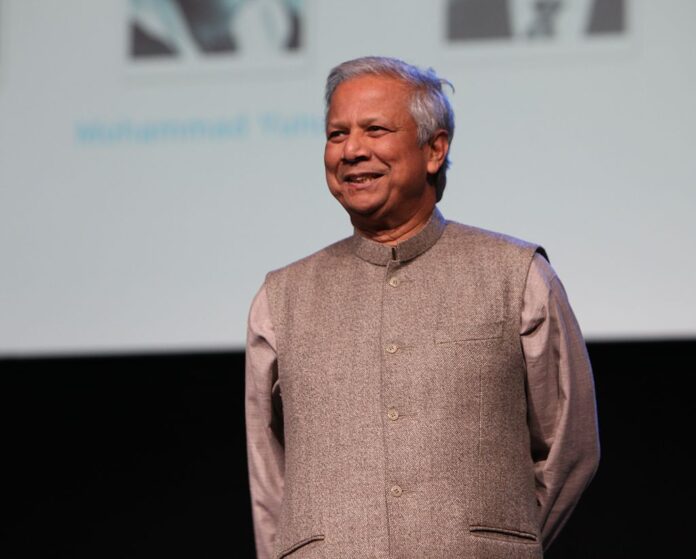Nobel laureate Muhammad Yunus takes charge of Bangladesh’s interim government following Sheikh Hasina’s resignation, pledging to restore stability and oversee upcoming elections
On August 8, 2024, Nobel Peace Prize winner Muhammad Yunus took the oath as the chief adviser of Bangladesh’s interim government. The ceremony, held at the presidential palace in Dhaka, marked a significant shift in the nation’s leadership after Prime Minister Sheikh Hasina’s abrupt resignation and subsequent flight to India.
At 84, Yunus assumes the role of interim leader in a period of intense political upheaval. The resignation of Hasina, following widespread protests and violence, has paved the way for Yunus to lead the country through a transitional phase aimed at restoring order and preparing for new elections. The protests, initially sparked by dissatisfaction with a government job quota system perceived as favouring Hasina’s party, quickly escalated into a broader challenge to her 15-year rule. Over 300 people were reported killed in the unrest, underscoring the severity of the crisis.
Embed from Getty ImagesYunus, renowned for his pioneering work in microcredit and his 2006 Nobel Peace Prize, returned to Bangladesh from Paris, where he had been attending the 2024 Olympics. His arrival in Dhaka was met with heightened security. During his inauguration, Yunus promised to uphold the constitution and address the country’s pressing issues with sincerity. His remarks emphasized unity and the potential for positive change in Bangladesh.
The new interim government, composed of Yunus’s advisers rather than ministers, includes notable figures such as Nahid Islam and Asif Mahmud from the Students Against Discrimination group, which played a key role in the protests against Hasina. Other appointees include Touhid Hossain, a former foreign secretary, and Syeda Rizwana Hasan, an acclaimed environmental lawyer. Adilur Rahman Khan, a human rights activist previously imprisoned by Hasina’s regime, also joined the interim team.
The absence of Hasina’s Awami League party representatives at the swearing-in ceremony highlights the fractured political landscape. Hasina’s departure has led to a power vacuum that Yunus must navigate while addressing the demands of a population yearning for reform.
Yunus’s first actions as interim leader will focus on restoring stability and ensuring a smooth transition to a new democratic government. He has urged citizens to avoid vengeance and work together to heal the nation. International responses to Yunus’s appointment have been positive, with Indian Prime Minister Narendra Modi extending best wishes and reaffirming India’s commitment to supporting Bangladesh. The U.S. State Department also expressed hope for collaboration with Yunus’s government to advance democracy and address recent violence.
Additionally, Yunus recently won a legal victory when a Dhaka tribunal acquitted him of a labour law violation related to a telecommunications company he founded. This acquittal removes a significant legal hurdle and positions him more favorably to lead the interim government.
Despite Yunus’s previous criticisms of Hasina’s administration and allegations of misconduct, his leadership represents a fresh start for Bangladesh. The interim government faces the challenge of stabilizing the country, reforming its political system, and preparing for elections amid a backdrop of political and social unrest.
Analysis:
Political: Yunus’s appointment as interim leader represents a significant shift in Bangladesh’s political landscape. His arrival comes at a critical time when the country is grappling with instability following Sheikh Hasina’s resignation. Yunus’s commitment to restoring order and overseeing elections will be closely scrutinized by both domestic and international observers. His leadership also signals a potential change in policy direction and governance style, contrasting with Hasina’s long tenure marked by increasing criticism and unrest.
Social: The appointment of Yunus reflects a response to widespread social dissatisfaction and demands for reform. The protests that led to Hasina’s resignation reveal deep-seated grievances among various segments of Bangladeshi society, particularly concerning government transparency and job allocation. Yunus’s pledge to unite the nation and address these concerns aligns with the public’s desire for a more equitable and responsive government.
Racial: The immediate impact of Yunus’s appointment on racial dynamics is less pronounced. However, the broader context of political reform and stability could influence ethnic and racial relations within Bangladesh. Efforts to restore order and reform government practices may contribute to a more inclusive and fair societal structure.
Gender: Gender issues are indirectly relevant in this context. Yunus’s leadership could influence policies affecting women, especially given his history with microcredit initiatives that have empowered women in rural areas. The interim government’s approach to gender equality and women’s rights will be a key area to watch as Yunus navigates the country’s recovery.
Economic: Yunus’s economic background and experience with microcredit could impact Bangladesh’s economic policies during his interim leadership. The focus on restoring stability and preparing for elections will be crucial for economic recovery and investor confidence. Yunus’s previous work has highlighted the importance of financial inclusion, which may influence his economic policies as he leads the country through this transitional period.
